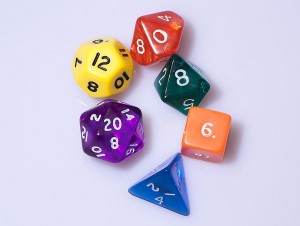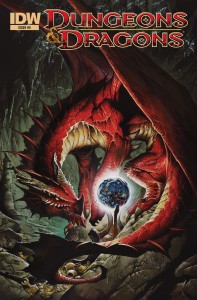By Gabrielle Bauman –
Penn Manor has a dark, dirty little secret – we play D&D.
That’s right, Dungeons and Dragons. The ultimate nerd activity, the point of no

return where any person admitting participating in the activity faces ostracization by their peers and being preached at by their pastors. Pop culture often portrays it as something only overweight older men living in their mother’s basement do.
Despite all of the stereotypes, however, Penn Manor has a small, very quiet base of players.
They behave like wild animals — skittish at first, but with some coaxing will admit that they play DnD. But they do play, and it’s not what others will lead you to believe. It’s a bit like a secret club, with its own code phrase – you admit that you play first to gain into their confidence.
Dungeons and Dragons, or DnD, is a fantasy role playing game where players create characters and work with other characters to go on quests and solve problems with the in-game world. It is played the old fashioned way: with pen and paper, and players rely on their imagination to create the fantastic world around them.
The player can really be whoever they want to be, from a gnome berserker to a half-orc thief. The possibilities are really only limited to the player’s creativity.
One Penn Manor student had something to say about his experience with the game “It is so much fun.”
It isn’t just for boys either, “It’s not gender segregated at all. Our group is like half girls and half boys.”
Tabletop roleplaying games tend to have a bad reputation in popular press and culture. In 1979 James Dallas Egbert III, 16, went missing. Later it was discovered that he had attempted suicide, and following his failure had hid out at a friend’s house for a month. The fictionalized book and movie Mazes and Monsters was based off this event, and the press mostly took the story of the teen who had had a psychotic break while playing a Live Action Role Play game as fact.

Following that there was a moral panic by parents groups and christian organizations. The Christian organizations claimed that the role play involved and the pretend interaction with monsters constituted devil worship. In an article by Chick Publications, a christian website, “Dungeons and Dragons is a tragic and tangled subject. It is essentially a feeding program for occultism and witchcraft. ” The same website has this comic, which portrays the game as sinister. The conclusions made by the author of the comic are based on the audience’s ignorance of the subject, harking back to the moral panic over Harry Potter.
According to Conservapedia, the conservative Christian version of Wikipedia that screens editors beforehand, “the possibility exists that such an experience may not be beneficial or appropriate for everyone… Due to the nature of roleplaying games, a great deal depends upon the individual group in question; a given game of Dungeons and Dragons might be benign from a Christian standpoint, or it might involve activities and ideas that a Christian would find profoundly distasteful.”
To be clear: There is no reliable research to back up the claim that roleplaying games cause players to lose touch from reality. There is nothing reliable supporting the idea that roleplaying gamers are antisocial.
Actually, it’s the opposite of that. In order to solve the problems presented by the situation, players have to work together — sink or swim. Just like online video games, Dungeons and Dragons can build friendships.
One local player was adamant about DnD having anything to do with the occult, as it has been blamed.
“They don’t play DnD obviously,” said the student. ” I’m tired of people just judging something that they don’t know anything about. Half the people don’t even know what it is.”
Another agreed, “It’s not what people think it is.”
The treatment that D&D experienced in the early 1980s echoes the argument against violent videogames now. Any player of a first person shooter can identify with the frustration of their parents misunderstanding the thing they love.
The reputation has kept some students away, but others show some interest in playing the game, “I would love to play it if I had a group to go to” said one Penn Manor junior.
The reputation of the game may be unnecessary in today’s world. Skyrim, a game extremely popular among Penn Manor’s students (and the source of endless sweetroll and arrow-to-the-knee jokes) is simply the next logical step from tabletop role playing games. Think about it. In Skyrim, players run around fighting monsters and doing quests for non player characters in need. The player can go to many exotic locales, save the day, and slay dragons. Just like DnD.
But should that stigma even be there? That’s the question that Penn Manor should be asking itself.
More at: 4c3ofsp4des